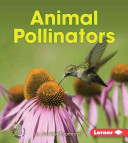2018 School Spending Survey Report
Animal Pollinators
9781467757416.
ea vol: 24p. (First Step Nonfiction: Pollination). glossary. index. photos. Lerner. 2015. lib. ed. $23.99.
COPY ISBN
VERDICT Suitable additions for those looking for material on plants or flowers.
For seeds to grow, pollen needs to reach a flower's carpel. In
simple language (with potentially difficult words in bold print),
this series teaches early readers about the various ways this
happens; information is often repeated from book to book. Close-up
photos (inconsistently labeled and captioned) of flower structures
and yellow pollen dust on fuzzy bees and bats help readers
visualize the process. Glos., ind. Review covers the following
First Step Nonfiction: Pollination titles: Animal
Pollinators, Cross-Pollination, Insect
Pollinators, Self-Pollination, and Parts of a
Flower.
ALREADY A SUBSCRIBER? LOG IN
We are currently offering this content for free. Sign up now to activate your personal profile, where you can save articles for future viewing





Be the first reader to comment.
Comment Policy:
Comment should not be empty !!!